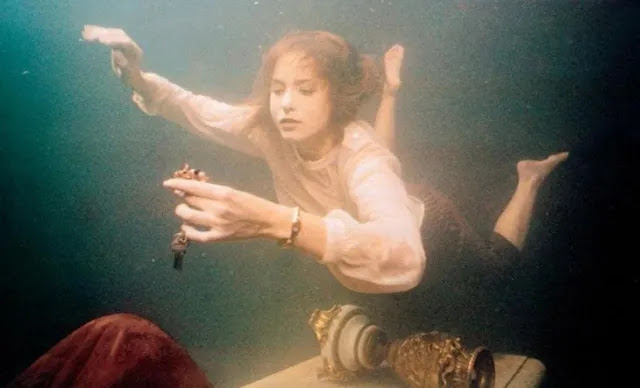PHENOMENALITY: *marvelous*
MYTHICITY: *good*
FRYEAN MYTHOS: *drama*
CAMPBELLIAN FUNCTIONS: *metaphysical*
In my review of Dario Argento's SUSPIRIA, I made no comment upon the writer-director's assertions that the 1977 movie was supposed to be one of three films patterned after a concept Argento had found in a work by Victorian writer Thomas deQuincey. I don't entirely buy that the creator, visionary though he often was, had been thinking that far ahead when he worked on SUSPIRIA (co-written with Daria Nicolodi). I fully believe that he took the name of the movie from the title of a DeQuincey essay, SUSPIRIA DE PROFUNDIS. But the film doesn't feel like it was meant to be part of any greater work. There's no actual reference to the idea of "The Three Mothers" mythology in the English dub and I've heard no testimony of any such references in the Italian original. I think it's likely that after SUSPIRIA enjoyed substantial box office, Argento decided to build on DeQuincey's conceit of "Three Sorrows," a trinity of "Mothers" identified by their specialities: Mother of Sighs, Mother of Darkness, and Mother of Tears.
The head witch in SUSPIRIA became the de facto Mother of Sighs in the expanded mythology, though her career is only indirectly mentioned in INFERNO, when viewpoint character Rose (Irene Miracle) reads that one of the Mothers dwelled in Freiberg, the setting for SUSPIRIA. The disposition of the Mother of Tears would not be committed to celluloid until twenty-seven years later, but INFERNO does a fine job explicating the horrors of the Mother of Darkness. The title "INFERNO" doesn't seem reference anything crucial in the story, though this film like SUSPIRIA ends when a building's set on fire. I'd rather believe the title was some veiled reference to the famous Dante poem, though there's no evidence of this.
The movie doesn't really tell viewers much of anything about Rose, just as the heroine of SUSPIRIA was something of a blank slate. Nevertheless, the script states that she's some sort of poet, and when she begins obsessing about the myth of The Three Mothers in an old alchemical tome, I recognized her as an established type in horror fiction: the seeker of forbidden knowledge. When she learns that the Mother of Darkness was supposed to reside in New York, she makes it her mission to suss out said residence-- and not surprisingly, she ends up paying for her curiosity.
Before Rose gets snuffed, though, she passes on her curiosity to her brother Mark (Leigh McCloskey), studying music theory in Rome. Strangely, long before Rose disappears and Mark flies to New York looking for her, the Mother seems to peg Mark as a future victim. He hasn't even read the letter Rose sends him about her investigation, but a strange woman ogles him in class, and a minor weird phenomenon happens in the room. Mark loses the missive, after which a girl, possibly one who likes him, finds the letter and tries to return it to him. The Mother reaches out and destroys her just for getting even marginally close to her shrouded legend.
There's no denying that INFERNO is constructed, like all Argento movies, so as to put on display his highly colorful set-pieces, usually though not always involving grotesque deaths. But this implication of the Darkness-Mother's ubiquity is far more ambitious than any of the erratic malignity in SUSPIRIA. Mark finds his way to the hotel where Rose stayed, and which she believed to be connected to the Mother in some way. He doesn't know that Rose is dead by this time, so he makes the acquaintance of the many oddball residents of the hotel. Particularly effective is the concierge (Alida Valli, now somewhat heavier than she was in SUSPIRIA three years previous), whose smile is a death-like rictus even though she's not literally involved with anything occult. A sickly young aristocrat named Elise (Daria Nicolodi) tells Mark that she knew Rose, but Elise's attempts to help Mark cost her dearly too. Other deaths take place, not because the victims endangered the Mother but just because they're close by and vulnerable to her malevolence. Eventually Mark figures out a clue from Rose's letter and beards the witch in her lair, though only dumb luck saves the naive fellow from her power.
In contrast to SUSPIRIA, INFERNO seeks to stimulate all the senses in one way or another. An early scene in which Rose plunges into an underwater cavern forces the viewer to imagine being surrounded on all sides by the feel of water, and two characters comment on the odd bittersweet smell in the area of the hotel. Argento's visual poetics are at their best here precisely because they aren't as inundating as those of SUSPIRIA, and on one occasion he even uses the lack of sound-- Mark's inability to hear Rose on the telephone-- to create suspense and anxiety. And though I quite liked Goblin's score for SUSPIRIA, I preferred INFERNO's subtler music, which composer Keith Emerson based in part on the operatic stylings of Verdi.
INFERNO now strikes me as a strange but potent marriage between the intellectual tradition of horror, as exemplified by H.P. Lovecraft, and the visceral tradition of the psycho-killers with which Argento began his giallo career. I saw the final film in the "trilogy" years ago and plan to re-screen it soon, but I'm not sure it's going to prove as fecund as this voyage into Darkness.

No comments:
Post a Comment